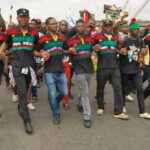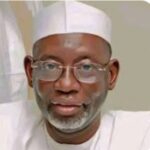By Joshua Biem & Ndu Nwokolo
Third World nations in general, particularly Africa, which includes Nigeria, struggle greatly with poverty. Many individuals in Nigeria live in poverty due to the country’s poor economic performance and other socio-political issues such as corruption, bad governance, prebendal politics, etc. Insecurity and poverty are Nigeria’s most pressing two main development challenges. Although reducing poverty in the country emerges as every government’s top priority, considerable efforts to make it work remain undone.
Consequently, many parts of the country are plagued by insecurity rooted in political, strategic, and socio-economic motives. For instance, economic challenges tied to insecurity are exacerbated by high unemployment, low production, high cost of doing business, poor infrastructures, inconsistent economic policies, corruption and inept public sector governance.
Despite a plethora of promises for revamping the economy by the new administration of President Tinubu, realities from the current rapid economic reforms have brought about untold financial hardships to millions of Nigerians and other residents, at least in the short term. This ranges from the removal of fuel subsidies to increases in some taxes and proposed hikes in electricity tariffs. The ripple effects of the removal of fuel subsidies and the rumoured proposed electricity tariff increase have caused much confusion and hardship with regard to the entire value chain and ecosystem of the informal economy, where most of the population features.
The informal economy most affected are the local transportation system, the trading activities in Physical Consumer Markets (PCM), and the local staple food industry like the bread industry. Therefore, the reality on the ground remains, despite the good intention of these economic policies, there is a resultant increased pervasive poverty. The majority of Nigeria’s security issues during the present democratic era have their origins in the nation’s extreme levels of poverty and inequality. Thus, this edition of Nextier SPD Policy Weekly interrogates the economic reforms from the lens of worsening poverty and its effect on increasing insecurity in Nigeria.
* POVERTY AND INSECURITY
Poverty is a direct result of a lack of jobs, poor education, as well as lack of infrastructure and social justice; this, in turn, feeds into sectarian violence, crime, and terrorism which are on the rise today in the country. For instance, poverty and unemployment are often graded together and are seen as primary ingredients that are breeding grounds for several conflicts. This is because the nation has a sizable population of impoverished individuals who, in a fit of rage, are readily available and prepared to engage in criminality. Against this backdrop, any serious economic plan must relate actions like removing oil subsidies to managing poverty. The policy response of the Buhari administration was a proposed N5,000 one-off cash transfer to about 40 million households. Thus, the absence of resultant cushioning effects implies increased poverty and a scramble to resort to alternative options to make ends meet.
Drawing from the frustration-aggression theory, the rising poverty levels tend to heighten tensions in the most affected, creating a sense of frustration leading to aggression. Frustration is a feeling of tension that occurs when our efforts to reach a goal are blocked. According to this theory, proposed by Dollard (1939), frustration often leads to aggression. This frustration-aggression in the Nigerian context would be followed by increased criminal activities from unemployment and the inability to meet certain basic needs. Data from the Nextier violent conflict database show that violent conflict incidents stood at 96 between 29th April to 28th May, while 111 incidents were recorded from 30th May to 29th June. This beckons to support that insecurity is on the rise. The attacks in Plateau state in June 2023 and the increasing tensions in the Southeast through sit-at-home orders portray an insecurity trajectory capable of blowing out of proportion.
* FOOD INSECURITY
The Food and Agriculture Organisation (FAO) estimates that about 14.4 million Nigerians face a food crisis. The FAO also holds that the figure comprises 385,000 internally displaced persons (IDPs) in 21 states and Abuja’s Federal Capital Territory (FCT). From the lens of food insecurity, the worsening poverty levels from the economic reforms have made access to essential goods difficult. This is through the high transportation costs of moving food products. This has been felt more by subsistent rural farmers. Rural communities have higher extreme poverty rates and greater difficulties transporting and distributing agricultural products. Thus, with this challenge comes discontent and resorting to criminality and violence in an already tense clime.
* DIFFERENTIATING POLITICS FROM SOCIO-ECONOMIC REALITY
Swinging into action is an expectation that every new administration focuses on. Economic reforms, beckon to question whether these actions have a long- or short-term benefit or are mere political moves to provide a perception of an active government. The revelation by the world bank on the effect of fuel subsidy removal is that over four million people have been plunged into poverty in the first half of 2023. Stakeholders have warned that more Nigerians may fall into poverty if President Bola Ahmed Tinubu does not implement his administration’s changes per the advice of his policy advisory council.
The withdrawal of fuel subsidies also brings to the forefront the alleged corruption inside Nigeria’s political system. Subsidies have a history of claims of mismanagement, fraud, and fund diversion. Despite subsidies being phased out to reduce corruption by eliminating a main outlet for misappropriation, the abrupt removal has the potential to create discontent among the bottom liners of the populace.
* AVOIDING THE CONFLICT TRAP
In many areas of Nigeria, there has been an increase in violence and armed conflict, which has made poverty even worse (see chart above). On the other hand, poverty has also increased the frequency of wars in Nigeria, trapping the country’s economy in a conflict cycle for many years. A World Bank report titled ‘Breaking the Conflict Trap’ shows poverty has proven to be both a cause and a consequence of conflict. Breaking the conflict trap hangs on the nation’s ability to improve the citizens’ quality of life by reducing the poverty rate significantly. Insecurity causes poverty, but deprivation increases the likelihood of violent conflict, creating a state of insecurity as such development is key to creating an avenue for resource utilisation, growth, protection and opportunities which puts more people above the poverty line.
* RECOMMENDATIONS
The Nigerian government should prioritise addressing how fiscal and monetary policies affect employment, prices and productivity to reduce the number of people pushed below the poverty line. By reducing aggravated poverty, there is a reduced tendency for resorting to crime in an already tense security atmosphere.
When it comes to monetary policy, the government should first simulate how the economy would be affected by the unification of exchange rates to estimate the number of external reserves needed to maintain that policy.
Reforms and the removal of petrol subsidies are critical for rebuilding fiscal space and restoring macroeconomic stability. However, implementing a robust cash transfer programme to provide quick relief to the most affected households is necessary.
A major limiting factor to interventions is a lack of continuity. Addressing the trend of lack of continuity by various government interventions should take priority.
There is a need for an all-hands-on-deck approach to make the most from the proceeds of the subsidy removal for fast-paced development. Where development is successful, nations are gradually less vulnerable to violent conflict, facilitating further development. Countries are highly susceptible to falling into a conflict trap where fighting ruins the economy and raises the likelihood of more insecurity when development fails.
* POLICY RECOMMENDATIONS
The Nigerian government should prioritise addressing how fiscal and monetary policies affect employment, prices and productivity to reduce the number of people pushed below the poverty line.
The Nigerian government must implement a robust cash transfer programme to provide quick relief to the most affected households and those worst hit by the reforms.
There is a need for the Nigerian government to simulate how the economy would be affected by the unification of exchange rates to estimate the amount of external reserves needed to maintain adopted monetary policies.
There is a need to address the trend of lack of continuity by various government interventions.
There is a need for an all-hands-on-deck approach to make the most from the proceeds of the subsidy removal for fast-paced development.
* CONCLUSION
Thus, the ever-increasing poverty rate is one of the major drivers of insecurity. Poverty and insecurity are interlinked, just as are wealth and security; as long as people are impoverished, security will remain a phantom. In an already tense conflict clime, economic reforms with both long- and short-term benefits require careful consideration and accompanying cushioning measures to achieve the desired goal. The establishment of the nexus between poverty and increased insecurity necessitates transparency and focus in the execution of reforms. This can be done with the aim of avoidance of fuelling the existing security challenges.
(Joshua Biem is a Policy and Research Analyst at Nextier; while Dr. Ndu Nwokolo is Managing Partner at Nextier and an Honorary Fellow at the School of Government at the University of Birmingham, UK)



